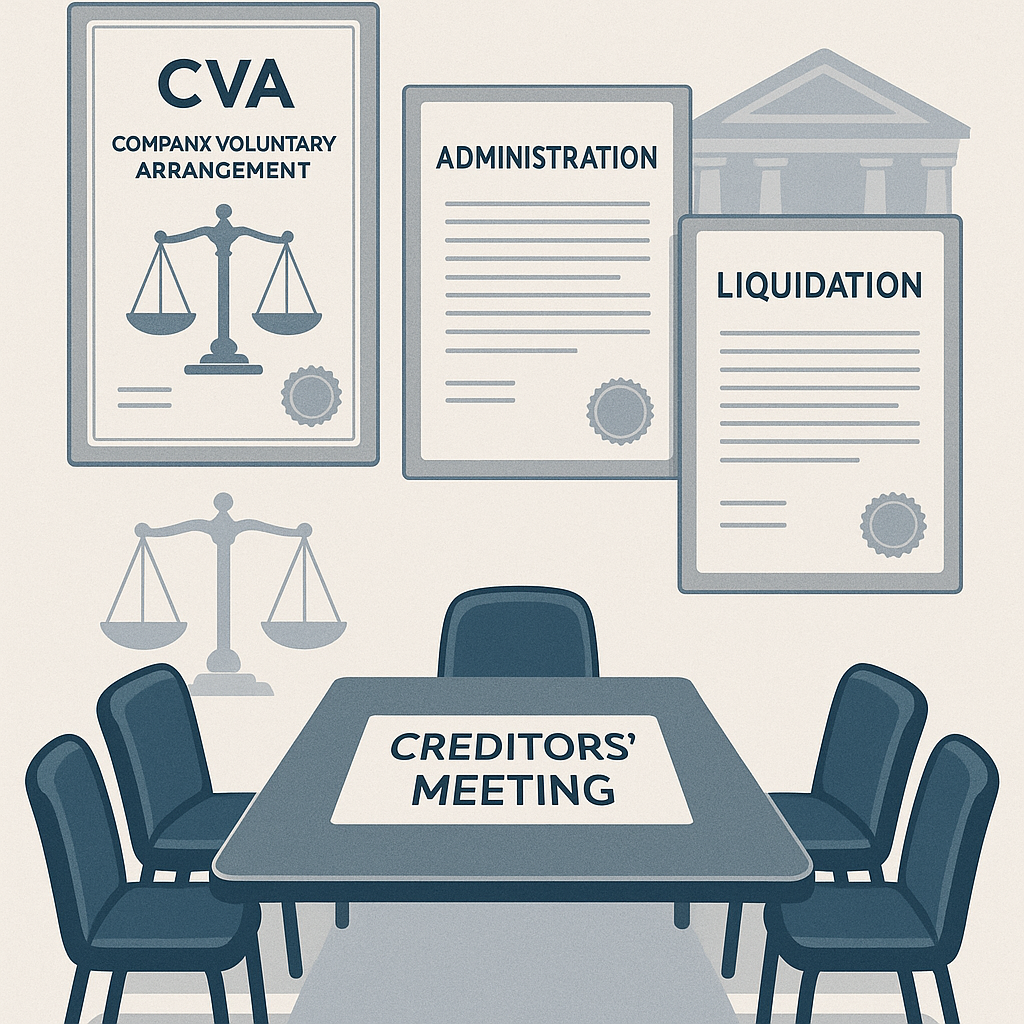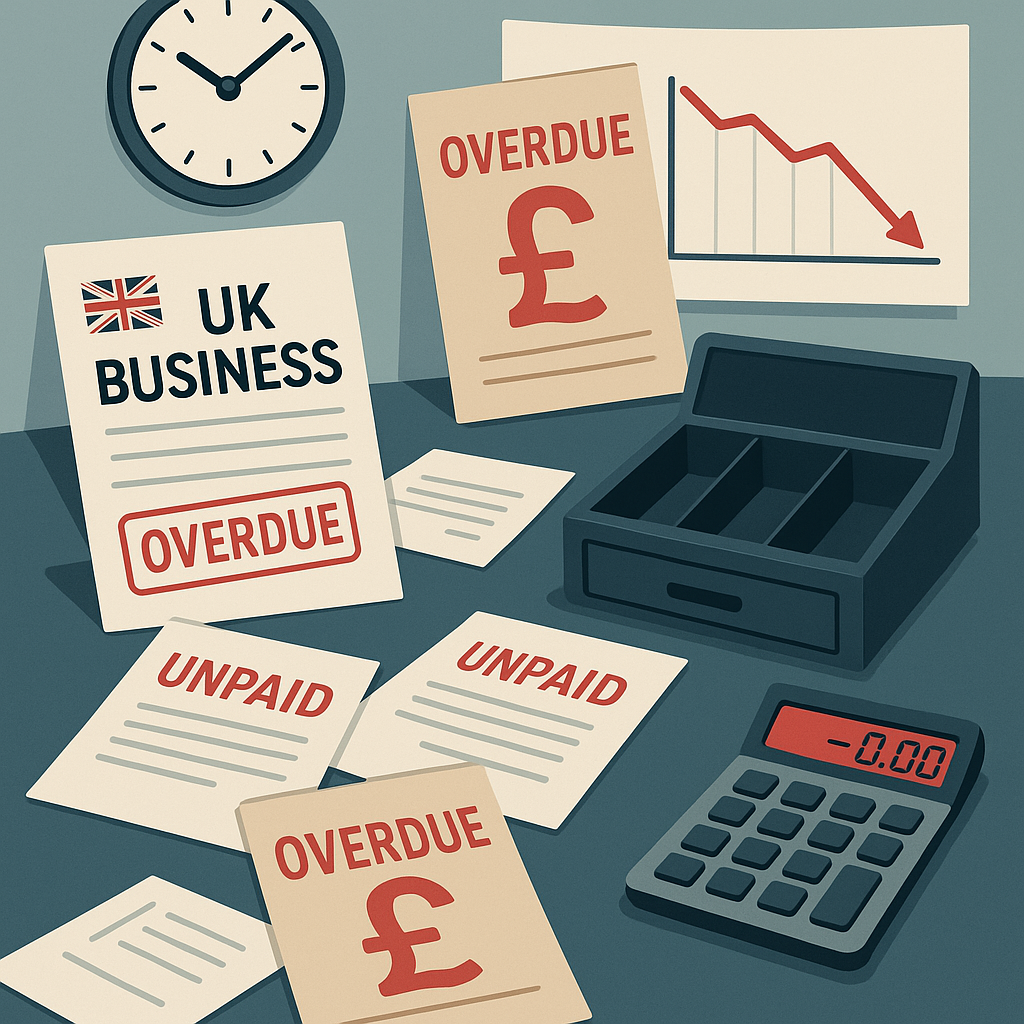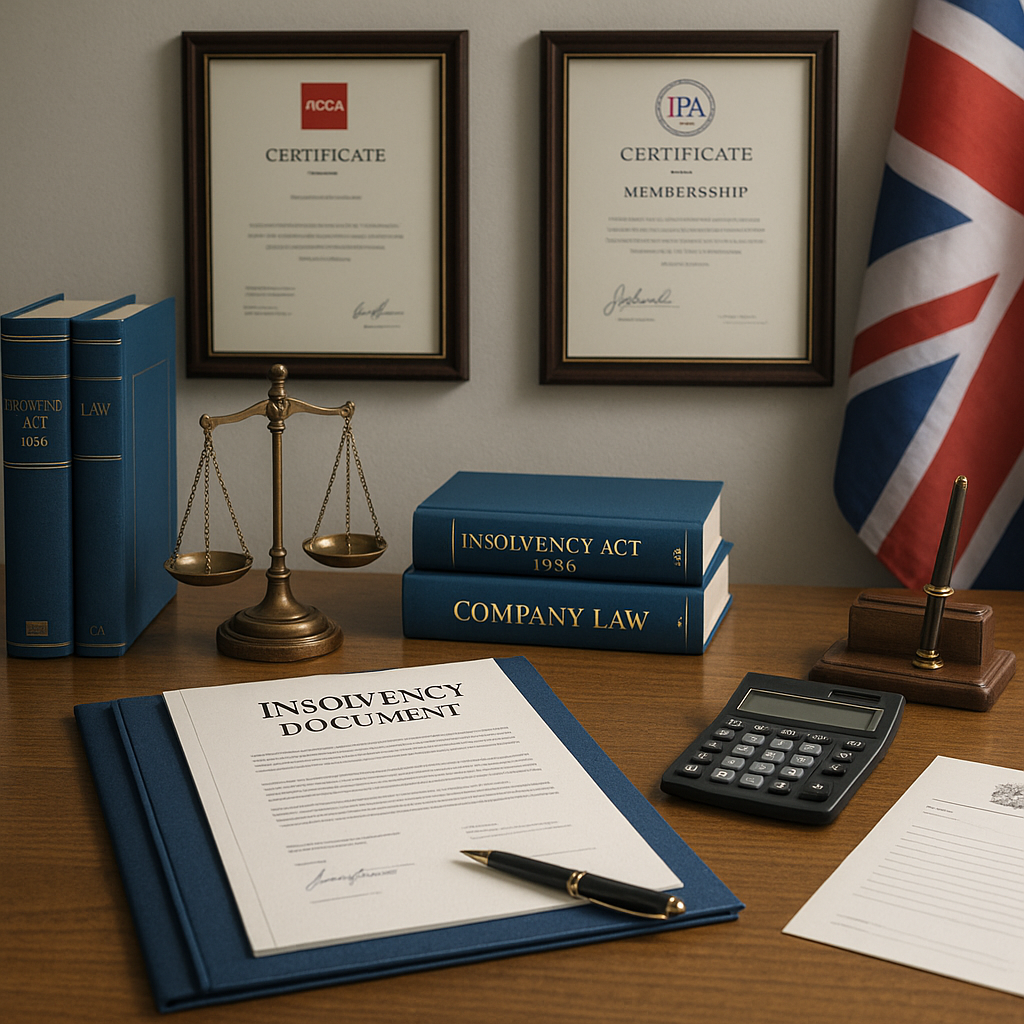What Happens When You Hire an Insolvency Practitioner Many UK directors and business owners face stressful financial problems—ranging from mounting debts to the risk of compulsory liquidation. When these challenges surface, seeking professional support can be the turning point. Hiring an insolvency practitioner UK for your company brings legal protection, business rescue opportunities in the […]
Who Are Insolvency Practitioners and What Are Their Key Roles?
Facing financial struggles can feel overwhelming for business owners and company directors, leaving you searching for ways to stabilise operations and chart a clearer course ahead. In such challenging times, understanding the role of insolvency practitioners is essential. These professionals play a crucial part in addressing financial difficulties—especially when helping companies navigate solvent versus insolvent liquidation scenarios—and guiding businesses through tough circumstances. A key requirement is that licensed insolvency practitioners must pass examinations administered by the Joint Insolvency Examination Board. This article explores how these specialists can support your business during financial crises. We will examine their core responsibilities, how to find the right insolvency practitioner, and when it's time to seek their advice. To delve deeper into the role of an Insolvency Practitioner (IP), it is important to understand their significance in financial distress situations. An Insolvency Practitioner is a licensed professional authorised to handle insolvency cases. This includes acting as a liquidator when a company undergoes liquidation, taking on the role of an administrator in the administration process, and assisting with procedures such as Company Voluntary Arrangements (CVAs) and Individual Voluntary Arrangements (IVAs). Their core responsibility is to guide businesses and individuals facing insolvency by working to either rescue the business or, when that's not possible, maximising returns for creditors. Insolvency Practitioners must be accredited by recognised institutions like ACCA or the IPA. They work within insolvency laws, ensuring compliance and equitable outcomes. With expertise in personal and corporate insolvency, IPs manage formal processes and prevent further financial instability, protecting both the company and creditors. An insolvency practitioner is a qualified professional authorised to manage the affairs of an insolvent individual or company. They play a vital role in navigating formal insolvency proceedings such as bankruptcy, administration, and voluntary arrangements. The practitioner's primary objective is to either rescue the business, liquidate its assets to benefit creditors, or negotiate a settlement. To carry out their duties, insolvency practitioners must be licensed by an official body, such as the Insolvency Service, ensuring they meet rigorous standards and possess the expertise to manage intricate financial issues. Insolvency practitioners guide companies through financial difficulties, offering corporate insolvency solutions like restructuring or liquidation. They are regulated to ensure ethical practices and legal compliance, protecting both businesses and creditors. Insolvency practitioners bear a vital part in managing the financial strain within firms. They provide insolvency advice and shoulder the responsibility of the formal insolvency process such as administration, company voluntary agreements, and liquidation. Their expertise assists companies in managing complex financial scenarios by evaluating the company's viability and devising ways to recover debts or reorganise finances. These licensed professionals work closely with creditors, shareholders, and directors to ensure a fair and transparent insolvency process. They aim to optimise returns for creditors whilst also trying to salvage the business if feasible. In cases where recovery is impossible, insolvency practitioners oversee the orderly winding up of a company, ensuring legal obligations are met. Costs vary based on the case complexity and process type, and are usually paid from company assets. Businesses should understand these fees for financial planning. Insolvency practitioners play a crucial role in resolving companies' financial distress. They take insolvency appointments to assess the situation thoroughly. These professional insolvency practitioners work closely with all parties involved - including creditors, debtors, and company directors. Their main goal is to find a viable solution that serves everyone's best interests. They offer insolvency advice based on the specific circumstances of each case. This might involve formal insolvency procedures such as administration or voluntary arrangements. Throughout the process, they aim to maximise returns for creditors whilst trying to save the business if possible. A regulated insolvency practitioner acts as a neutral party to balance the needs of all stakeholders during financial difficulties. Identifying the right insolvency practitioner is crucial for companies facing financial hurdles. Your choice can greatly impact your business's future and ability to navigate insolvency. Opting for a seasoned and understanding professional will offer not only legal fulfilment but also strategic counsel to traverse through challenging periods fruitfully. Finding the right insolvency practitioner is crucial for business owners, company directors, and financial professionals facing financial distress. It ensures that they receive expert guidance throughout the insolvency process. These steps will guide you in selecting an insolvency expert who can navigate through challenging financial times effectively. Selecting a reputable insolvency practitioner is crucial for aptly managing your company's financial distress. Search for a licensed and regulated professional with the right qualifications and experience to guide you through the insolvency process. Evaluate their past experiences in dealing with parallel situations to gain trust in their capability to provide personalised advice tailored specifically for your business. Contemplate services provided by local insolvency practitioners regulated by professional bodies based on your specific circumstances. Some might be experts in administration or receivership, whilst others could focus more on voluntary arrangements. Evaluating their past performance can give insight into how they might manage your situation, enabling a decision that aligns with the future of your business. Choosing a suitable professional leads directly to understanding why opting for a licensed insolvency practitioner is crucial. These insolvency practitioners hold a licence to take insolvency appointments, ensuring they comply with the Insolvency Act's stringent standards. They provide peace of mind that your company's financial distress is in capable hands. Licensed by the insolvency authorities, these experts bring legitimacy and expertise to managing your business's potential recovery or orderly closure. A licensed insolvency practitioner plays a vital role in safeguarding interests across the board from creditors and shareholders to employees. By adhering to established regulations and ethical codes from professional bodies, they ensure that all legal obligations are met during the insolvency process. Their oversight guarantees that actions taken are fair, maximising returns to creditors whilst protecting company directors from future legal complications related to wrongful trading or insolvent trading accusations. You may need to engage an insolvency practitioner if your company has difficulties meeting its debts. This could indicate potential insolvency. An insolvency practitioner can assist you in understanding formal insolvency procedures, including administration and voluntary arrangements. They offer insolvency services tailored to aid companies in financial distress. Engaging with an insolvency expert sooner can provide advantages such as identifying methods to prevent a total downfall. Insolvency practitioners are licensed professionals who analyse the company's financial status, work in conjunction with secured creditors, and guide directors through the insolvency process. If you observe persistent cash flow issues or receive complaints from creditors, it's the right moment to seek counsel from a local insolvency practitioner. Recognising early insolvency signs can help your company to avoid severe financial distress. Acting quickly upon spotting any of these indicators within your business is crucial. Proactively addressing early warning signs by consulting an insolvency practitioner online can help avoid mandatory liquidation. They may offer restructuring options like Administration or CVAs. Selling company assets could also improve liquidity and settle debts. Identifying signs of insolvency leads directly to the critical step of understanding the insolvency process. The journey begins once a business or individual acknowledges financial distress. An essential part of this process involves appointing a licensed insolvency practitioner. This expert navigates through insolvency proceedings, adhering strictly to the Insolvency Act 1986 and Statements of Insolvency Practice. The role of an insolvency practitioner is to manage company assets, deal with creditors, and oversee any necessary legal action. Their work is highly regulated to ensure fairness and compliance with law. Companies facing insolvency might enter into administration, liquidation, or company voluntary arrangements (CVAs), depending on their specific circumstances. Gaining an understanding of the insolvency process lays the foundation for recognising why timely consultation with an insolvency practitioner can be pivotal. Early engagement with a licensed professional in the field of many insolvencies offers crucial advantages. It allows businesses to explore all available restructuring and avoidance options before financial troubles become unmanageable. This proactive approach can save time, reduce the costs of insolvency, and preserve company value. Consulting an insolvency expert early can provide strategic advice to avoid bankruptcy. A licensed review may identify underutilised company assets or inefficiencies, improving cash flow and solvency. The cost of hiring an insolvency practitioner can vary widely. This depends on the complexity of your financial issues and the nature of the insolvency proceedings you require. For many businesses, understanding these costs upfront is crucial for budgeting purposes. Factors like the size of the company, amount of debt, and assets involved play a significant role in determining fees. Insolvency firms often provide quotes based on their services' specifics needed for each case. These may include administration, preparing statements of insolvency practice, or supervising a protected trust deed among others. Comparing costs across different firms and ensuring that your chosen insolvency practitioner holds a valid insolvency licence will help manage expenses effectively during this challenging time. Different aspects determine the rates of recruiting insolvency specialists. The intricacy of the insolvency procedure has a notable influence. More involved cases demand further time and expertise, resulting in elevated charges. Moreover, your business's scale and formation directly affect the fees. A business possessing a larger size with numerous assets and creditors will likely incur higher costs due to the significant work required in managing its financial difficulties. The selection of an insolvency resolution method also impacts the insolvency practitioner cost. For example, administration or company voluntary arrangements might need different levels of effort and expertise from an insolvency specialist compared to less complicated liquidation procedures. Specialists modify their rates based on these aspects, along with any extra services such as asset assessment or creditor negotiation that your case might require. Planning for the costs of insolvency proceedings is a crucial step for business owners and company directors. The price can vary depending on the nature of your situation and the insolvency services required from an insolvency practitioner. Typically, fees relate to the complexity of work needed, such as asset evaluation, creditor negotiations, and legal filings in accordance with the Insolvency Act. It would help if you also considered additional expenses like court fees or charges for selling property. To effectively budget for these proceedings, start by getting quotes from several licensed insolvency practitioners. Compare their fees alongside the scope of services they offer. It's essential to factor in both fixed costs and variable ones that might arise during the process. This approach enables you to set aside a realistic fund that covers all potential expenses without straining your company's remaining resources too much. In a Company Voluntary Arrangement (CVA), an insolvency practitioner plays a crucial role. This professional assesses the company's financial situation to understand if a CVA is a viable option. They work closely with company directors, guiding how to propose feasible repayment plans to creditors. The insolvency practitioner aims to devise arrangements that offer the best possible outcome for both the indebted company and its creditors. As part of their duties, they also liaise with all involved parties, ensuring clear communication throughout the process. Once stakeholders accept a CVA proposal, the insolvency practitioner oversees its implementation. They act as a supervisor, monitoring compliance and managing payments from the company to its creditors according to agreed terms. They ensure both parties adhere to the CVA terms, aiming for business recovery and creditor satisfaction. Through planning and negotiation, they help companies avoid liquidation, preserve jobs, and ensure sustainable operations. Company Voluntary Arrangements (CVAs) offer a flexible approach for businesses facing financial difficulties to repay their debts over time. An insolvency practitioner works closely with the company to agree on a manageable plan with creditors. This arrangement allows companies to continue operating whilst addressing their financial obligations, providing a vital lifeline during tough times. The role of the insolvency practitioner here is crucial; they assess the company's situation, propose the CVA to creditors, and oversee its implementation once approved. Such arrangements can also positively impact creditors and company directors by offering a structured repayment method rather than facing potential losses in case of liquidation. An insolvency practitioner steps in to manage a company's voluntary arrangement. They work closely with the business to create a plan that allows it to continue operating whilst repaying creditors over time. This involves assessing the company's finances, identifying assets that can be used to support repayments, and setting up regular payments to creditors. Their goal is to find a balance that keeps the business running and satisfies creditor demands. The process also includes negotiating with creditors, aiming for an agreement that reduces the overall debt burden without weakening the company. Insolvency practitioners use their knowledge of insolvency laws and financial strategies to convince creditors this approach is beneficial for both parties. Understanding the impacts on creditors and company directors brings us to the significant role of insolvency practitioners in this intricate field. These licensed professionals have profound knowledge of the insolvency regime, ensuring every step is within the legal boundaries of administration law. Their work surpasses mere advice; it expands to creating detailed reports for the insolvency department, making them essential in times of financial distress. Choosing an experienced insolvency practitioner becomes vital when encountering financial difficulties. They direct you through each stage, whether it involves reaching out to an insolvency practitioner online or moving through voluntary arrangements with creditors. Business owners and directors must realise early engagement with these experts can significantly alter their company's future path to a more financially secure position. Why is an Insolvency Practitioner Needed?
How do we define an Insolvency Practitioner?

The Insolvency Practitioner's Role in Financial Distress
How Insolvency Practitioners Operate
How to Find an Insolvency Practitioner
Steps to Find an Insolvency Practitioner
Choosing the Right Professional for Your Needs
Importance of a Licensed Insolvency Practitioner
When Do You Need an Insolvency Practitioner?
Signs Your Company May Be Insolvent

Understanding the Insolvency Process: Key Steps, and Legal Procedures
Benefits of Early Engagement with an Insolvency Expert
The Cost of Hiring an Insolvency Practitioner
Factors Influencing the Cost of Services
Budgeting for Insolvency Proceedings: Planning, and Effective Strategies
The Role of an Insolvency Practitioner in Company Voluntary Arrangements

Understanding Company Voluntary Arrangements
How an Insolvency Practitioner Facilitates Arrangements
Conclusion
How Are Insolvency Practitioners Appointed – UK Expert Guide Navigating financial turmoil can be overwhelming for company directors and sole traders alike. Faced with mounting debts, threats of compulsory liquidation, or creditor demands, knowing “how insolvency practitioners are appointed” becomes crucial for preserving your organisation. In the UK, professional insolvency services, such as company voluntary […]
Administration might be your lifeline when your company's drowning in debt and creditors are circling. But here's what most directors don't understand: it's not just about buying time — it's about buying the right kind of time, with the proper professional support. The difference between administration working for you or against you often comes down […]
Can an Insolvency Practitioner Stop Creditors? In the UK, mounting pressure from creditors can disrupt cash flow, increase stress for directors, and push a company toward insolvency. Professional guidance plays a pivotal role in countering these challenges. Nexus Corporate Solutions Limited specialises in helping businesses find relief from persistent creditors, providing strategic solutions that align […]
When your company's in financial trouble, one of the biggest worries is what happens to everything you've built. Your equipment, property, stock — the assets that represent years of hard work. It's a valid concern, and you're not alone. The reality? How insolvency practitioners handle your company's assets can make or break the outcome for […]
Insolvent trading can trigger severe repercussions for UK directors, including personal liability and possible disqualification. When a business is unable to pay debts and continues to trade without a reasonable prospect of avoiding insolvency, the law may classify this as wrongful trading. The Insolvency Act 1986, alongside related legislation, outlines civil and criminal penalties for […]
Recognising the signs of business insolvency early is vital for UK companies. Overlooked warning signals—such as recurring cash flow issues, unpaid HMRC tax arrears, or missed staff wages—can quickly escalate into serious risks that demand immediate attention. Being aware of these common signs of business insolvency enables directors to take timely action, whether through careful […]
Supplier insolvency can have serious consequences for UK companies, creating ripple effects that extend beyond the affected supplier. Cash flow interruptions, delayed payments, and increased operational risks are common outcomes. When a key supplier or client becomes insolvent, contracts may be disrupted, insurance coverage can be affected, and overall profitability may decline. Nexus Corporate Solutions […]
Struggling with IVA monthly payments can feel overwhelming, especially when daily financial obligations pile up. An Individual Voluntary Arrangement (IVA) is designed to help those in debt regain stability by consolidating and managing repayments under a legally binding agreement. However, life changes—like reduced monthly income, sudden expenses, or shifts in personal circumstances—often make sticking to […]
Experiencing financial difficulty can make everyday life more challenging, especially when an individual or business director needs to secure a stable living arrangement. In the UK, an Individual Voluntary Arrangement (IVA) offers a legally binding debt solution that eases pressure from creditors. However, many worry about problems renting after IVA. Questions about how this might […]

Address: Apex Building, 1 Water Vole Way, Balby, Doncaster, South Yorkshire, DN4 5JP
Tel: 01302 430180
Services
Company


